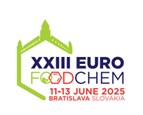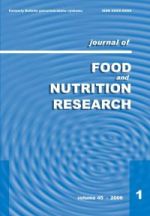Scientific journal
Journal of Food and Nutrition Research
Summary No. 3 / 2018
Pušić, I. – Beer Ljubić, B. – Vihnanek Lazarus, M. – Radin, L. –
Dietary organic selenium supplementations affect oxidative stability of chilled and frozen chicken meat
Journal of Food and Nutrition Research, 57, 2018, No. 3, s. 274-283
Jasna Aladrović, Department of Physiology and Radiobiology, Faculty of Veterinary Medicine, University of Zagreb, Heinzelova 55, HR-10000 Zagreb, Croatia. Tel.: +385 1 2390 173, fax: +386 1 2390 187, e-mail: jasna.aladrovic@vef.hr
Received 2 October 2017; 1st revised 2 February 2018; accepted 17 March 2018; published online 21 August 2018
Summary: The aim of the study was to determine the effects of supplementary dietary organic selenium on oxidative stability and quality of cooled and deep-frozen chicken breast and thigh muscles. The research was undertaken on broilers Cobb 500 subdivided to three randomly assigned groups: inorgSe0.3 (sodium selenite added to feed at 0.3 mg·kg-1), orgSe0.3 (organic selenium added to feed at 0.3 mg·kg-1) and orgSe0.5 group (organic selenium added to feed at 0.5 mg·kg-1). Samples were probed while stored at 4 °C (immediately after cooling, and after 1 day, 3 days and 7 days) and at –20 °C (after 30 days and 90 days) after slaughter. Organic selenium feed supplementation resulted in selenium muscle enrichment. Increased deposition of selenium in breast muscles was found in all groups, but only in orgSe0.5 group in thigh muscles. Higher glutathione peroxidase activities on the day of slaughter in both muscles, and glutathione as well as catalase were determined in tight muscles. Addition of organic selenium at 0.3 mg·kg-1 and 0.5 mg·kg-1 of feed improved oxidative stability during the first few days of storage, with more pronounced effects in the breast muscle.
Keywords: chickens; muscle; oxidative stability; organic selenium
Download:
(pdf, 379.08 Kb, 1151x)










